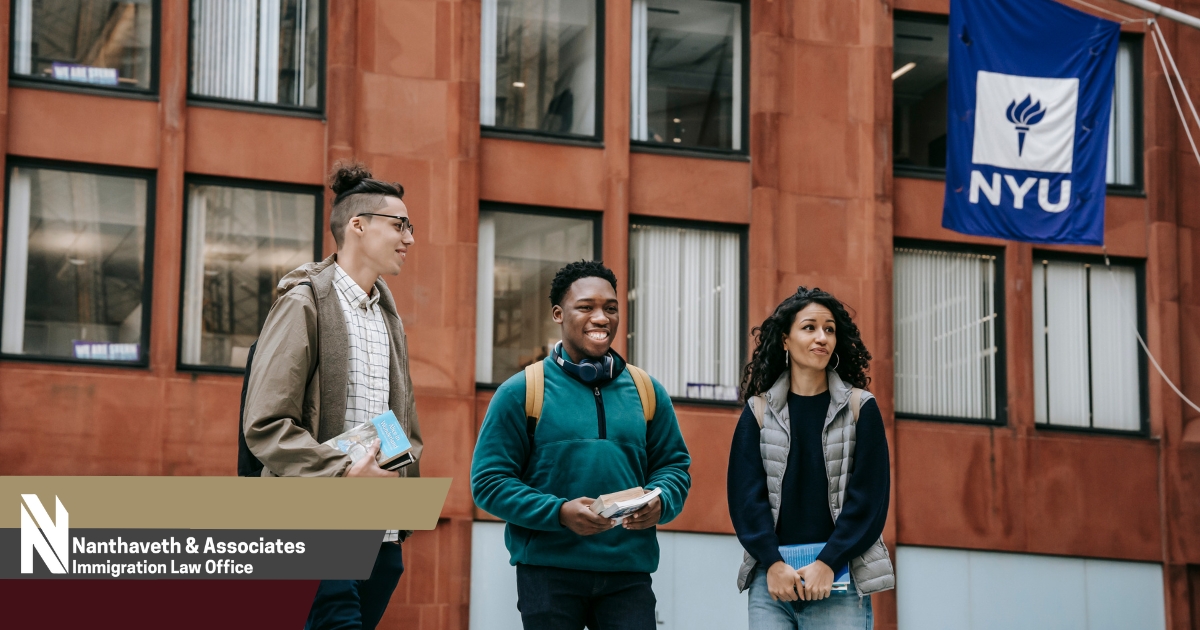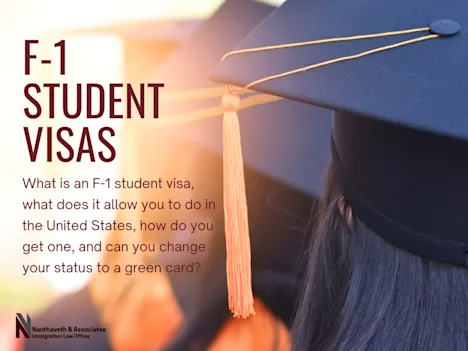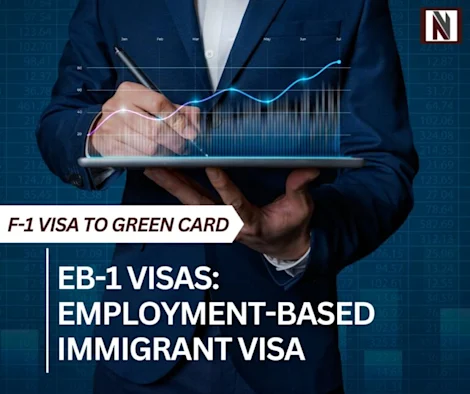Changing Status from F-1 Student Visa to
Green Card Holder

The F-1 student visa is designed for temporary stays in the United States for full-time academic study. One of its key requirements is that students intend to return to their home country after completing their education. However, life plans can change—and for some, that includes seeking permanent residency in the U.S.
Transitioning from an F-1 visa to a green card is complex and fraught with risks. While recent USCIS guidance acknowledges that F-1 students can be the beneficiaries of immigrant visa petitions, navigating this path requires extreme care. Mistakes can lead to falling out of status, which can have serious and lasting immigration consequences.
This guide explores the potential pathways available to F-1 visa holders who wish to become permanent residents—and why consulting an experienced immigration attorney is essential before making any moves.
An F-1 student visa is a temporary visa that allows academic students to come to the United States to study at an accredited academic institution as a full-time student.
One of the requirements for applying for an F-1 student visa is that you maintain your residence abroad and that you have no intention of giving it up.
But what happens if you get to the United States and plans change?
While USCIS did issue policy guidance recognizing that foreign students can become the beneficiary of an immigrant visa petition without necessarily violating the terms of their F-1 visa, the transition from a student visa to a green card is complicated, uncertain, and delicate.

If you are thinking about seeking an immigrant visa and you are currently in the United States on a student visa, you must seek the guidance of an experienced immigration attorney. You mustn’t proceed with any plans without first speaking to a lawyer or you may permanently jeopardize your future.
If you violate the terms of your student visa, even accidentally, you can “fall out of status.” That means you immediately and automatically lose your right to be in the United States. If you fall out of status, it will be recorded as an unlawful stay on your permanent immigration record.
Potential pathways that could result in obtaining an immigrant visa if you currently hold an F-1 visa include:
- Self-petitioning for an EB-1 immigrant visa
- Adjusting your status to an H-1B visa with dual intent
- Becoming the beneficiary of an employment-based immigrant visa
- Investing in a U.S. business
- Marrying a U.S. citizen or lawful permanent resident
- Applying for U nonimmigrant status as a crime victim
- Entering the Diversity Lottery
Keep in mind, your student visa is a temporary visa. As a temporary visa holder, you put yourself at risk by attempting any immigrant pathway without consulting with an expert in immigration law. None of these pathways are guaranteed, some are even unlikely, and one of them is something we hope you’ll never have to experience. In this guide, we examine each.
Self-Petitioning for an EB-1 Immigrant Visa
By the time you have completed your academic studies in the United States, it’s entirely plausible that you may be able to prove that you have achieved an extraordinary ability in your field of study.
EB-1 visas are an employment-based immigrant visa that allow for self-petitioning. They are not easy to attain.
You may qualify for an EB-1 immigrant visa if you can demonstrate extraordinary ability in education, the arts, the sciences, or business.
This type of immigrant visa is not available to everyone. However, it is a potential pathway to becoming a lawful permanent resident.

Adjusting Your Status to an H-1B Visa with Dual Intent
When you’ve finished your studies, you may be able to work in the United States for additional training through either a curriculum practical training (CPT) or and optional practical training (OPT). With CPT, you would be employed by your school for a short time. With OPT, your employment must be directly related to your major area of academic study.
From this F-1 authorized employment, you may be offered a job requiring an H-1B employment visa. The H-1B employment visa allows for dual intent. As an H-1B visa holder, your options for obtaining an immigrant visa increase.
Becoming the Beneficiary of an Employment-Based Immigrant Visa
You may be able to change your status from an F-1 student visa to another type of employment-based visa as well. The EB-2 immigrant visa and the EB-3 immigrant visas are easier to qualify for than the EB-1 visas mentioned earlier.
EB-2 immigrant visas are for people who receive a job offer and have attained one of the following:
- An advanced degree and five years of progressive work experience
- An exceptional ability in the arts, the sciences, or business (which is less difficult to prove than an extraordinary ability)
- A National Interest Waiver
EB-3 immigrant visas are for professionals, skilled workers, and some other workers with two years of training in their field.
Apart from people who qualify for self-petitioning through a National Interest Waiver, these employment-based immigrant visas require sponsorship and a job offer from a U.S. employer.
Investing in a U.S. Business
If you can substantially invest in a business in the United States, you may be able to participate in the EB-5 investor visa program.
To do this you must make a minimum investment of $800K in a commercial business located in an area with high unemployment or in a rural community.
If you’d like to invest in another type of business, your investment must be at least $1.05M.
Marrying a U.S. Citizen or Lawful Permanent Resident
Often, the easiest path to obtaining lawful permanent resident status is the pathway for which you can’t plan. If you fall in love and eventually marry a lawful permanent resident or U.S. citizen, you could potentially be eligible for a marriage-based green card.
Applying for U Nonimmigrant Status as a Crime Victim
While this is never a pathway that anyone would choose deliberately, it does exist. If you sustain substantial physical or mental abuse as the victim of a serious crime while in the country and have information that may bring your offender to justice, you may be eligible for U nonimmigrant status.
U visa holders may become eligible to apply for adjustment of status to lawful permanent resident after three years.
Entering the Diversity Lottery
Some F1 student visitors have even achieved their immigration goal through the Diversity Visa Program, also known as the Diversity Visa Lottery.
It is free to enter. Previous guidance from the Department of State and Department of Homeland Security indicated that simply submitting an entry doesn’t show “immigrant intent,” just a willingness to start a new adventure if offered.
Keep in mind, if you are selected under this program, you must contact a lawyer. Do not submit a visa application without planning a path forward with your attorney.
Get Advice from an Experienced Immigration Attorney
Besides these options, your attorney may suggest another less used option if it suits your situation better. If you are contemplating trying to change your status from a student visa to any other visa or status, you must not file any applications or petitions without seeking counsel from an experienced immigration attorney.
For your own protection, you need someone on your side with experience navigating the complex pathways offered by U.S. immigration law. If you are near Austin, San Antonio, or Houston and considering your immigration options, contact Nanthaveth & Associates for legal guidance.


11211 Taylor Draper Lane Suite 107
Austin, TX 78759
Tel: (512) 828-3791
Hours: 8:00 AM - 6:00 PM
Payment: all major credit cards, cash, check, money orders, cashiers check
Directions To Our Office
Areas Of Service
Copyright © 2025 | Nanthaveth & Associates | Immigration Law Firm Marketing Specialist MarketCrest
Not all consultations are free, and they are not all conducted by Vi Nanthaveth.
